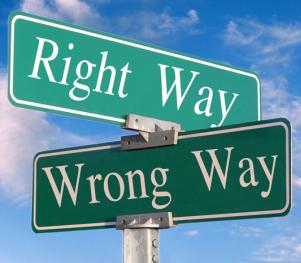
Consult a preacher about morality and he will tell you that like everything else, it is a gift from god. Without this divinely imparted sense of right and wrong, you will be told, all would be lost. There would be no standard for human behavior other than for each person to act as his own conscience dictates. Without this god-given morality, the world would be marred by chaos, uncertainty, and unspeakable acts. A true Hobbesian jungle in which there is no “objective” way to view human behavior.
Such is the critique by Rabbi Adam Jacobs on Huffington Post, which seems to have an endless supply of rabbis and other unimaginative clergymen whose thinking is limited by a belief in celestial magic. I am not very much interested in specifically critiquing Rabbi Jacobs since he makes a charge against atheists that so many others have made and will continue to make. I will however, quote one relevant paragraph because it typifies this kind of accusation:
“What I do not yet understand is why [Sam Harris] (or any atheist for that matter) makes so many moral proclamations. The average atheist makes certain basic assumptions about reality: that we all exist as a result of blind and purposeless happenstance, that free will is illusory, that there is no conscious ‘self’ and that there is no objective right or wrong. As Dr. Will Provine has said, ‘[as an atheist] you give up hope that there is an imminent morality…you can’t hope for there being any free will [and there is]…no ultimate foundation for ethics.’”
He goes on to say that to be an atheist is to be amoral because atheism does not allow for an objective standard of morality. According to Jacobs, only theism can provide this much needed behavioral benchmark. And so any pretense on the part of atheists to be able to judge right from wrong is actually a subjective exercise because, well, on whose authority are such judgments being made?
This is the reasoning of a slave. The notion that a divine engineer is necessary to provide universal norms of behavior is one that recurs everywhere—among Jewish populations, Christian populations, Muslim populations, and so on. Such is the purpose of religion, to provide an explanation for life—its nature and meaning, as well as how it ought to be lived. This is morality by revealed wisdom. No thinking necessary.
One immediate problem with Jacobs’ view is the sheer of volume of disagreement on moral questions that believers in god have amongst each other. Take for example, the Ten Commandments, the most famous and perhaps the most important divine moral instructions for those in the Judeo-Christian tradition
The Sixth Commandment admonishes, “Thou shalt not kill.” This seems a straightforward dictum. And yet believers of all kinds cannot seem to agree on a whole range of issues in which this commandment is a central concern. Ask a group of Catholics, or Protestants, or Jews about the death penalty, or if and when it is ever morally acceptable to use lethal self-defense, or if it is ever right to kill in war. See if you can find a uniformity of opinion with respect to any of these questions, even among members of the same faith.
Or take, “Remember the Sabbath; to keep it holy.” Jews and Christians do not even agree on which day the Shabbat falls. Nor do they agree on what kinds of activities can be performed on that day. And while we’re at it, why is it that Christians and kosher Jews do not see eye to eye on the matter of pig consumption? They are after all praying to the same Yahweh.
How about, “Honor thy father and thy mother”? What form shall this honoring take? Is the honor to be bestowed even on those parents who are negligent or abusive? What exactly is so “objective” about this or any of the aforementioned instructions? One could go on in this fashion for days, but I’m sure you can think of your own examples of Biblical or Koranic ambiguity. Clearly, even when morality is assumed to emanate from divine wisdom, these rules still lend themselves to subjective interpretation.
Granted, Jacobs and his ilk might very well concede the above points without agreeing that they have damaged the contention that atheists must necessarily be amoral or that divine sanction is a prerequisite for moral objectivity. One of the more interesting (and wrong) arguments I’ve heard that defend this position admits that religion is flawed because it is a “human endeavor,” which is to say it’s as corruptible as anything else. In which case, what is religion for?
No comments:
Post a Comment